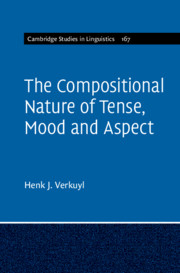Book contents
- Frontmatter
- Dedication
- Contents
- List of Figures
- List of Tables
- Preface
- 1 Introductory Chapter
- 2 How to Deal with the Long Tradition of Going Ternary?
- 3 Binary Tense Structure
- 4 Naive Physics and Aspectual Composition
- 5 Levels of Interaction between Aspect and Tense
- 6 Binary Tense Structure and Adverbial Modification
- 7 How to Deal Binarily with ...?
- 8 Tense, Mood and Aspect
- Appendix
- Bibliography
- Author Index
- Subject Index
6 - Binary Tense Structure and Adverbial Modification
Published online by Cambridge University Press: 08 October 2021
- Frontmatter
- Dedication
- Contents
- List of Figures
- List of Tables
- Preface
- 1 Introductory Chapter
- 2 How to Deal with the Long Tradition of Going Ternary?
- 3 Binary Tense Structure
- 4 Naive Physics and Aspectual Composition
- 5 Levels of Interaction between Aspect and Tense
- 6 Binary Tense Structure and Adverbial Modification
- 7 How to Deal Binarily with ...?
- 8 Tense, Mood and Aspect
- Appendix
- Bibliography
- Author Index
- Subject Index
Summary
Chapter 6 aims at accounting for modification by temporal adverbials. The binary approach allows them to operate on different levels of tense structure above S_0. Crucial is the new insight that the relation between modifier A and modified B is not to be expressed as location of A in B but rather as the intersection of A and B. This insight and the flexibility of (deictic) adverbial modification offers the possibility of presenting a structural solution to the Present Perfect puzzle. It also sheds light on the nature of the in/for-test: it explains why terminative sentences with a for-adverbial introduced at a higher level may be regarded as well-formed as opposed to those which require a token interpretation.
Keywords
- Type
- Chapter
- Information
- The Compositional Nature of Tense, Mood and Aspect , pp. 169 - 210Publisher: Cambridge University PressPrint publication year: 2021

